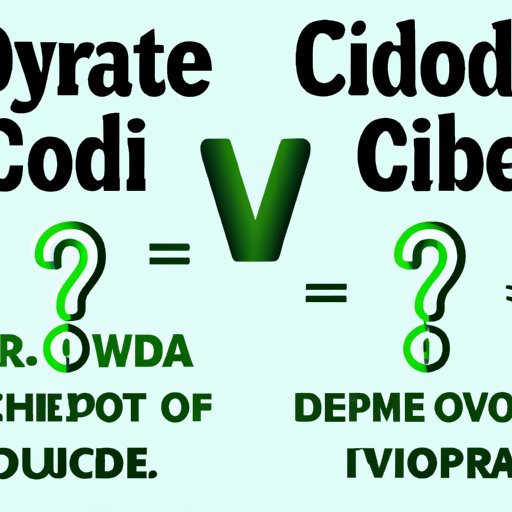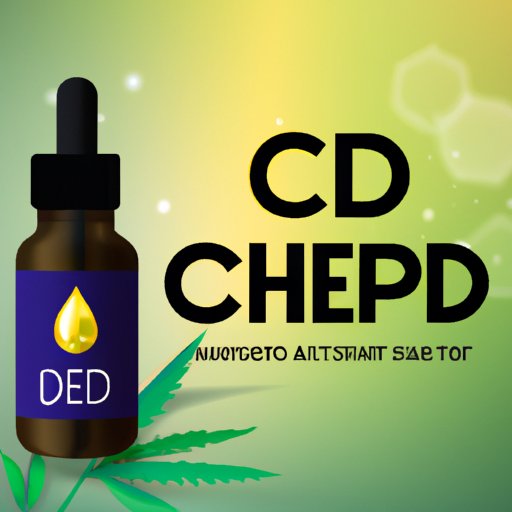I. Introduction
Are you confused about the difference between CBD oil and hemp oil? You’re not alone. With so many products on the market today, it can be challenging to distinguish between the two and choose the right one for your needs. The purpose of this article is to help you understand the differences so that you can make an informed decision and get the most out of the product you choose.
II. Understanding the Differences: A Comprehensive Guide Between CBD Oil and Hemp Oil
Before we get into the differences, let’s define what CBD oil and hemp oil are.
A. What is CBD oil?
CBD oil is a concentrated extract that comes from the flowers, leaves, and stalks of the hemp or cannabis plant. It contains high amounts of cannabidiol, a chemical compound known for its therapeutic effects.
- Definition: CBD oil is a type of oil extracted from the hemp or cannabis plant.
- Extraction process: CBD oil is extracted from the flowers, leaves, and stalks of the hemp or cannabis plant using CO2 or ethanol extraction.
- Active ingredients: CBD oil contains high amounts of cannabidiol, a chemical compound known for its therapeutic effects.
B. What is hemp oil?
Hemp oil, also known as hemp seed oil, is derived from the seeds of the hemp plant. It contains low amounts of cannabinoids, including CBD, but is rich in essential fatty acids, vitamins, and minerals.
- Definition: Hemp oil is a type of plant oil extracted from the seeds of the hemp plant.
- Extraction process: Hemp oil is extracted from the seeds of the hemp plant using a cold-pressing process.
- Active ingredients: Hemp oil is rich in essential fatty acids, vitamins, and minerals, but contains low amounts of cannabinoids, including CBD.
C. How are they different?
Despite coming from the same plant, CBD oil and hemp oil are chemically different and have distinct uses and benefits.
- Chemical composition: CBD oil contains high concentrations of cannabidiol, while hemp oil contains low amounts of cannabinoids, including CBD.
- Uses: CBD oil is commonly used for its therapeutic benefits, including pain relief, anxiety and depression management, and epilepsy treatment, while hemp oil is widely used in skincare, hair care, and as a dietary supplement.
- Legal status: CBD oil is legal in most states, while hemp oil is legal in all 50 states.
III. CBD Oil vs. Hemp Oil: What’s the Difference and How to Use Them?
Both CBD oil and hemp oil provide numerous health benefits and can be used in various ways. Here’s a quick comparison of CBD oil and hemp oil in terms of medical benefits, therapeutic effects, and possible side effects.
A. Comparison of CBD oil and hemp oil in terms of:
- Medical benefits: CBD oil has been shown to help manage pain, anxiety, and seizures. Hemp oil is rich in fatty acids, vitamins, and minerals that support heart and digestive health, among other benefits.
- Therapeutic effects: CBD oil promotes relaxation, improves sleep, and enhances mood. Hemp oil is used in skincare as a moisturizer, skin treatment, and hair conditioner.
- Possible side effects: CBD oil may cause dry mouth, dizziness, and changes in appetite. Hemp oil has no reported side effects.
Based on their properties and benefits, here are some recommendations on how to use each oil:
- CBD Oil: Use CBD oil sublingually or topically for pain and anxiety management, or in capsule form for seizures and epilepsy treatment. It can also be used in cooking and baking for a relaxing effect.
- Hemp Oil: Use hemp oil in skincare as a moisturizer, lotion, or hair conditioner, or take it as a dietary supplement for overall health maintenance. It’s also great to use in cooking and baking for a nutritious boost.

IV. The Great Debate: CBD Oil Versus Hemp Oil for Health and Wellness
When it comes to using CBD oil or hemp oil for health and wellness, there’s a lot to consider. Here’s a discussion on the effectiveness of each oil for different health conditions, as well as their pros and cons and factors to consider when choosing which oil to use.
A. Discussion on the effectiveness of each oil for different health conditions
1. CBD oil
a. Pain management: CBD oil has been shown to help manage pain associated with various conditions, including arthritis, multiple sclerosis, and chronic pain.
b. Anxiety and depression: CBD oil has been shown to help manage symptoms of anxiety and depression and may be used as an alternative to prescription medications.
c. Epilepsy and seizures: CBD oil is widely used to treat seizures and epilepsy, particularly in children.
2. Hemp oil
a. Skin care: Hemp oil is a great moisturizer for both the face and body and can help reduce inflammation, redness, and other skin irritations.
b. Heart health: Hemp oil is known for its high levels of essential fatty acids, which are essential for heart health.
c. Digestive health: Hemp oil is a great source of fiber and can help improve digestion and prevent digestive disorders.
B. Pros and cons of using CBD oil vs. hemp oil for health maintenance
Both CBD oil and hemp oil have their pros and cons, depending on what you’re trying to achieve.
CBD oil pros:
- Effective pain and anxiety relief
- More potent than hemp oil
- May improve mental health
CBD oil cons:
- May cause dry mouth, dizziness, and changes in appetite
- May produce psychoactive effects
- More expensive than hemp oil
Hemp oil pros:
- Rich in essential fatty acids and vitamins
- Excellent moisturizer for skin and hair
- No reported side effects
Hemp oil cons:
- Does not contain high amounts of CBD
- May be less potent than CBD oil
- May have a nutty taste that is not desirable to some people
C. Factors to consider when choosing which oil to use
When deciding which oil to use, there are several factors to consider, including:
- Medical condition or symptoms: If you’re looking for pain or anxiety relief, or want to improve your mental health, CBD oil may be a better choice. If you’re primarily looking to improve your skin or hair health, or your overall digestive health, hemp oil may be a better fit.
- Intended use: If you want to use the oil as a dietary supplement, for cooking or baking, or as a moisturizer, choose hemp oil. If you want to use it for therapeutic benefits or to manage a specific condition, choose CBD oil.
- Personal preferences: Consider the taste, price, and method of use when choosing between CBD oil and hemp oil.

V. Breaking Down the Differences Between CBD Oil and Hemp Oil for Everyday Use
Both CBD oil and hemp oil can be used in a variety of everyday settings. Here are some examples of how each oil can be used:
A. Examples of everyday uses for CBD oil:
- Cooking and baking for a relaxing effect
- Skincare and beauty for anti-inflammatory effects
- Supplements for anxiety and pain relief
B. Examples of everyday uses for hemp oil:
- Cooking and baking for a nutritious boost
- Hair care for a moisturizing effect
- Supplements for overall health maintenance
Considerations for choosing the right oil for a specific purpose:
- Choose CBD oil for its therapeutic benefits and effectiveness in managing pain, anxiety, and seizures
- Choose hemp oil for its nutritional benefits and effectiveness in improving skin and hair health, as well as digestive health
- Choose the method of use that is most suitable for your purpose and lifestyle
VI. CBD or Hemp Oil? Which One Should You Choose for Your Needs?
When choosing between CBD oil and hemp oil, focus on your needs and intended use. Here are some factors to consider:
- Medical condition or symptoms: If you’re looking to manage pain, anxiety, or seizures, CBD oil may be a better choice. If you’re looking to improve skin or hair health, or your overall digestive health, hemp oil may be a better fit.
- Intended use: If you want to use the oil for therapeutic benefits, choose CBD oil. If you want to use it as a moisturizer, dietary supplement, or for cooking and baking, choose hemp oil.
- Personal preferences: Consider the taste, price, and method of use when choosing between CBD oil and hemp oil.
